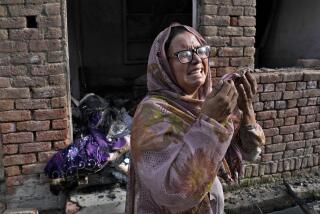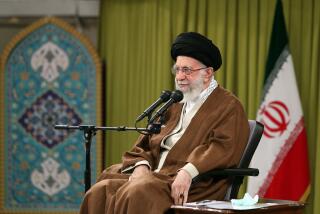Pakistan’s Blasphemy Law Under Heightened Scrutiny
- Share via
NEW DELHI — Ayub Masih, a young Pakistani from the village of Sahiwal, was condemned to death under his nation’s laws for defaming the Prophet Muhammad. The young man allegedly had praised “The Satanic Verses,” the Salman Rushdie novel that many Muslims consider insulting to Islam.
The harsh penalty for Masih, a Roman Catholic, for violating Pakistan’s notorious blasphemy law might have gone unnoticed, except for a stunning intervention by Bishop John Joseph.
Joseph, well-known in Pakistan as a human rights crusader, led a protest this week to the steps of the courthouse where Masih, 25, had been convicted April 27. There, the 65-year-old cleric committed an act that his religion considers a mortal sin: He put a gun to his head and fatally shot himself, supporters say, to protest a law he deemed abominable and unjust.
Joseph “killed himself so that the law might be killed,” said Father Simon Felix, a priest in the city of Faisalabad, 150 miles south of the Pakistani capital, Islamabad. “He struggled, struggled, struggled, but no one in the government would listen to him.”
Suddenly, though, Masih’s death sentence and the bishop’s suicide have drawn dramatic, sometimes violent, new attention to the blasphemy law that human rights groups and nations worldwide have assailed as a bludgeon against Pakistan’s Christians and other religious minorities.
Thousands of mourners turned out Friday at services for Joseph, many shouting that they will make sure he did not die in vain.
Mourners carried Joseph’s casket 25 miles from a memorial service in his home village of Khushpur to the Roman Catholic cathedral in Faisalabad, Associated Press reported. Outside the church, Pakistani police fired into the 2,000 mourners, who were chanting for their rights during the second day of protests against religious discrimination.
Three people, including a girl who suffered a stomach injury, were hospitalized with bullet wounds after the fracas. Protesters later raced down glass- and stone-littered streets to seek refuge in the city’s cathedral, where Joseph’s funeral is scheduled for Sunday.
Mian Asif, the local police chief, was quoted by AP as saying his officers were told to fire over protesters’ heads, but two who were hit by stones “fired directly at demonstrators against their orders.”
Christian lawmaker Johnson Michael, who was leading the procession, accused the police of provocation. “The police threw stones first. We are trying to calm down the mourners, but the authorities have provoked them,” he said.
The Pakistani policy, which keeps Masih imprisoned while his case undergoes appeal, has angered many, including the nation’s Roman Catholic clergy, who say his case illuminates how Pakistan’s blasphemy law is used to persecute the country’s 2.5 million Christians.
Details of the dispute are sketchy. But Masih was arrested in October 1996 after an argument with a neighbor in the Punjabi village of Sahiwal.
According to Pakistani human rights groups and Catholic priests, Masih’s was one of 15 Christian families among more than 200 in the primarily Muslim village. The groups say a Muslim neighbor of Masih made the accusations to chase him and the other Christian families off land coveted by the Muslims.
Mere mention of Rushdie’s writing infuriates many Muslims because of his satiric portrayal of Islam--work that so angered religious leaders in Iran that they issued a fatwa, or religious decree, calling for the assassination of the Indian-born British author.
“Masih said he would never dream of disparaging the Muslim religion,” said Aziz Siddiqui, joint director of the Pakistan Human Rights Commission in Lahore. “This was a predominantly Muslim settlement, and the families there wanted to get some land where the Christians were living.”
Masih’s trial was held in a jail after police uncovered an apparent plot by Muslim villagers to kill him.
Christians make up less than 2% of Pakistan’s population of 140 million. The country, the western third of the former British Empire in South Asia, was formed in 1947 as a refuge for Muslims from predominantly Hindu India. Since then, Christians in Pakistan have complained of unequal treatment at the hands of the Muslim majority.
Many Pakistani Christians occupy the country’s lower socioeconomic levels and hold menial jobs. They are cleaners and house sweepers. Many complain that they have been the victims of forced conversions to Islam.
The provision of Pakistan’s penal code used against Masih has been invoked dozens of times; there are estimates of 200 Christians being imprisoned and facing the death penalty for violating the blasphemy rules.
The provisions, dating to the martial-law rule of Gen. Zia ul-Haq in the 1970s and ‘80s, carry a mandatory death sentence. Although no one has been executed under this measure, several of those charged have been slain after their release.
Raja Zafarul Haq, Pakistan’s minister for religious and minority affairs, expressed his grief over Joseph’s suicide but was quoted by news services as insisting that the blasphemy law is not directed against any particular religion.
Human rights groups say the law has been used by Islamic extremists to target the country’s Christian minority as well as Hindus and smaller Islamic sects, such as the Shiites and Ahmadis. All the law requires to charge someone is the testimony of one other man.
Catholics in Pakistan say the law is commonly used to advance ulterior motives.
“If someone wants a promotion, if they want to be, say, headmaster or headmistress in school, they can accuse someone,” Father Bonnie Mendes of Faisalabad said. “The law is very loosely worded. Anybody can be accused.”
A 1994 Amnesty International report concluded that in every case where a person had been convicted under Pakistan’s blasphemy law, “charges of blasphemy appeared to have been arbitrary, founded solely on the individuals’ minority religious beliefs, or unfounded and malicious accusations.”
“It is terrifying for us,” Mendes said. “Always this law is hanging over us.”
More to Read
Sign up for Essential California
The most important California stories and recommendations in your inbox every morning.
You may occasionally receive promotional content from the Los Angeles Times.













